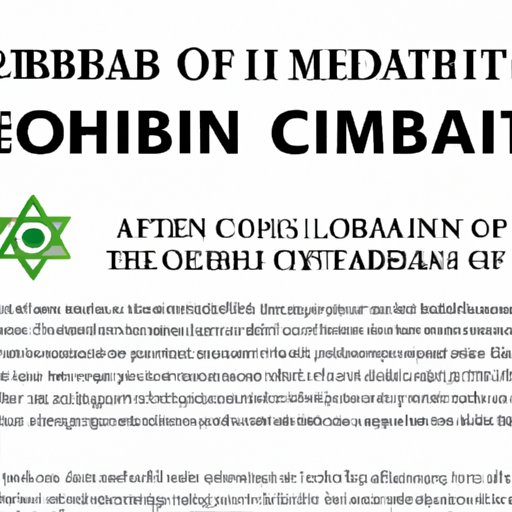Introduction
Recently, there has been an ongoing debate regarding the permissibility of CBD in Islam. While some argue that it falls under the general category of drugs and intoxicants, others believe that it is permissible due to its non-psychoactive properties. In this article, we will explore this issue in-depth, providing a comprehensive guide to understanding the Islamic perspective on cannabidiol.

A Comprehensive Guide to Understanding the Islamic Perspective on CBD
The Quran and Hadith are clear in their prohibition of drugs and intoxicants due to their harmful effects on the mind and body. However, there is no specific mention of CBD or any other cannabinoid.
There are different opinions and interpretations regarding the permissibility of CBD in Islam. Some scholars argue that since it does not have any psychoactive properties, it can be considered halal (permissible). Others argue that it falls under the general category of drugs and intoxicants and, therefore, is haram (prohibited).
It is important to note that CBD is different from THC (tetrahydrocannabinol), the psychoactive compound found in marijuana. While marijuana is haram due to its psychoactive effects, CBD derived from hemp plants contains less than 0.3% THC and does not have any psychoactive properties.

Debunking Common Misconceptions about CBD and Islam
One of the most common arguments against CBD use in Islam is that it is associated with marijuana, which is haram. However, this argument is based on a misconception about the difference between CBD and marijuana. CBD is a non-psychoactive compound found in the hemp plant, while marijuana contains high levels of THC.
Another common misconception is that CBD is addictive and can lead to dependency. However, there is no evidence to suggest that CBD is addictive or has any potential for abuse. In fact, studies have shown that CBD may have potential benefits in treating addiction and substance abuse disorders.

The Benefits and Risks of Using CBD from an Islamic Point of View
CBD has been shown to have potential benefits in treating a variety of conditions, including anxiety, depression, pain, and inflammation. However, as with any medication or supplement, there are also potential risks and side effects to consider, including liver damage, drowsiness, and changes in appetite and weight.
From an Islamic point of view, it is important to weigh the potential benefits and risks of using CBD and to consider how it aligns with the principles of protecting one’s health and avoiding harm to oneself and others.
Is CBD Permissible in Islam? A Closer Look at the Religious Teachings and Rulings
There are different religious teachings and rulings regarding the permissibility of CBD in Islam. Some scholars argue that it is haram due to its association with drugs and intoxicants, while others believe that it falls under the category of mubah (permissible) or mustahabb (recommended).
It is important to note that different Islamic juristic schools have different rulings on this issue. Some scholars have issued fatwas allowing the use of CBD for medical purposes, while others have prohibited it altogether.
How to Navigate the Grey Area of CBD in Islamic Cultures
In Islamic cultures, drug and substance abuse are often stigmatized and viewed as a moral failing. It is important to have open and honest conversations about CBD and to educate oneself and others about its potential benefits and risks.
It may also be helpful to seek guidance from a trusted religious authority or healthcare provider in determining whether CBD is permissible and appropriate for one’s specific needs and circumstances.
Real-Life Stories of Muslims Who Use CBD: Perspectives, Experiences, and Challenges
There are many Muslims who use CBD for medicinal purposes, and their experiences and perspectives can provide valuable insights into this issue. Some have faced challenges and stigma due to their use of CBD, while others have found relief from chronic pain, anxiety, and other conditions.
It is important to listen to and learn from these stories, as they can help to promote understanding and acceptance of CBD use among Muslim communities.
Conclusion
In conclusion, the issue of whether CBD is permissible in Islam is a complex and nuanced one that requires careful consideration of religious teachings and medical evidence. While there are different opinions and interpretations, it is important to approach this issue with open-mindedness, education, and dialogue.
By understanding the potential benefits and risks of CBD, consulting with trusted religious and medical authorities, and learning from the experiences of others, Muslims can make informed decisions about whether CBD is appropriate and permissible for their specific needs and circumstances.
